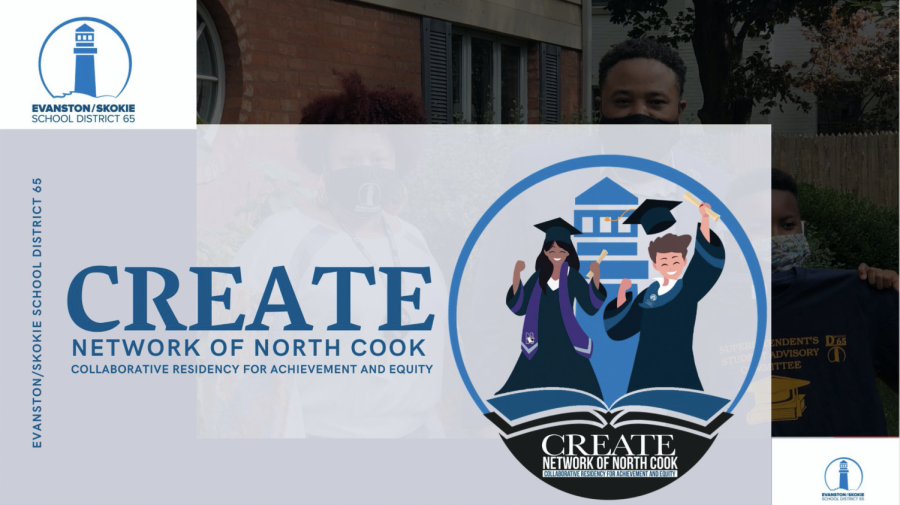D65 teacher residency partners with NU, National Louis University
Courtesy of Evanston/Skokie School District 65
Website design for CREATE Teacher Residency. The program will train 20 teacher residents starting in June.
May 6, 2021
Evanston/Skokie School District 65’s CREATE Teacher Residency program is partnering with Northwestern and National Louis University to train future teachers for the district starting in June.
Each CREATE resident will complete one year of in-classroom training alongside a teacher four days a week at Joseph E. Hill Early Childhood Education Center, Dr. Bessie Rhodes School of Global Studies or Dr. Martin Luther King Jr. Literary and Fine Arts School. Residents will receive a $30,000 stipend and, upon completion of the program, a Master’s Degree in Education from either university partner as well as a teaching position within District 65.
Laketa Simpson, the district’s diversity hiring specialist, said the goal of the program is to ensure the district’s teacher population is representative of its student population. One of the benefits of a teacher residency, she said, is the opportunity to diversify the district’s teaching staff so students can see teachers in front of them who are “reflective of their backgrounds and beliefs.”
“We have an opportunity to be really intentional around how we are developing our teachers,” Simpson said.
District 65 Superintendent Devon Horton said students benefit from having educators that look like them, but currently the district isn’t living up to that expectation. In a district where about 21 percent of students are Latinx and about 22 percent are Black, just 9.4 percent of teachers are Latinx and 13.2 percent are Black, he said.
Horton said many families have attended schools in the district for years without having a teacher reflective of their background. He hopes the program will increase the number of minority teachers within the district, and eventually, expand to surrounding districts.
Prior to his arrival at District 65, Horton developed teacher residency programs in two other districts. He said successful data for these programs indicates that teachers who complete residencies often outperform those who pursue traditional teaching degrees.
“It’s really strange to think that teachers come out more effective with one year of intense support, versus the four years cycle of a university,” Horton said.”But think about the science of how you prepare doctors. Doctors go through a residency for two, three years, like practicing working… and many times they do get employed in that hospital.”
Strong candidates for the program will have a social justice lens and truly believe students can learn, Horton said. He said the district is looking closely at teacher efficacy — if teachers have confidence in their ability to make a positive impact on their students, Horton said they’ll be able to help students understand the importance of speaking up for what is right.
Currently, the district is in the final stages of selecting its first 20 residents. Horton said most candidates will be from Evanston and nearby communities. Applicants come from a range of backgrounds and many have previously held different careers.
Kim Kelly, director of CREATE, said the program breaks down barriers for individuals who had been unable to follow their passion for teaching.
“We’re opening the door to people who are going to be excellent educators that may not have otherwise been able to take advantage and move forward with that career choice,” Kelly said.
Residents will undergo a year of intensive classroom training, and then will take part in a gradual release, gaining more responsibilities until they lead their own District 65 classrooms.
Kelly also said the program plays into the district’s goal of narrowing its historical racial achievement gap. Outcomes for minority students have not shifted in any remarkable way for forty years, but Kelly said the residency is a potential avenue for change.
“It’s time for us to be reflective of what’s happening,” Kelly said. “How is institutional racism showing up, and how do we disrupt that in a way that is collaborative, in a way that’s collective, in a way that’s thoughtful and reflective and supporting all of our teachers.”
Email: [email protected]
Twitter: @oliviagalex
Related Stories:
— District 65 Policy Committee meeting presents new achievement data
— District 65 parents of color lead march to cast ballots for equity-focused school board amid contentious election season
—District 65 emphasizes equity at last 2019-2020 meeting


